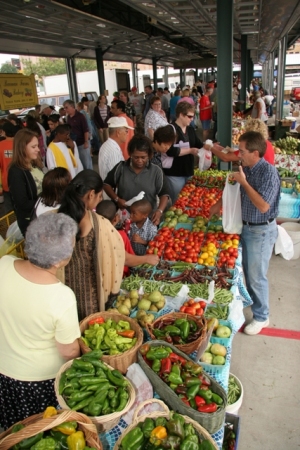This post is taken from a recent article from Organic Gardening.com
So you’ve decided to try and eat organic vegetables? You might even think that buying produce at local Farmers’ markets would even be better. Maybe, maybe not.

Types of Markets
Generally there are two types of farmers markets and various combinations there of.
Real Farmers Markets – are small markets, usually set up seasonally that feature produce from local farmers. It is up to you to ask whether or not the farmer grew their produce organically or not. These markets are “producer-only” markets where only the farmer can sell their own product. Keep in mind that the offerings may not be as large as a wholesale market. After all your local climate dictates when the produce is ripe. You don’t get watermelon in May in Atlanta, GA.
Re-sellers Farmers Markets – more often than not, you’ll find small farmers markets on the side of the road set up just like the real farmers markets, but the produce they are selling has been bought from a wholesale grocery or marketer that has gotten the produce from other states, or even other countries.

Look for Certified organic
If your market doesn’t certify that it’s food is grown organically it might be just as likely to contain chemicals as your local grocery store. National Organic Program, farmers who market their product as “organic” must become certified by a USDA-accredited third party and keep very detailed records regarding their farming practices. There is an exception: If growers earn less than $5,000 a year, they can legally market their produce as organic, provided they keep records to prove they are organic. They just don’t have to go through the certifying process.
Unless the farm is certified as organic you have no way to know if the farmer’s claims are true.
If your grower says he or she grows organic produce but is avoiding organic certification because of the cost, take that excuse with a grain of salt. “I find that particular argument to be very frustrating,” says Franczyk. “The smallest growers are exempt from certification under the National Organic Program.” Beyond that, growers who gross between $5,001 and $20,000 a year generally only pay about $100 a year when it’s all said and done because the federally subsidized program refunds up to three-quarters of the cost. “That is pretty cheap for putting a trained third-party inspector on farm every year,” says Franczyk. Again, some farmers may be truly organic but opt out of the certification program. But you’ll want to ask more questions to be sure that they’re not talking the talk without walking the walk.

Bugs on your food
If you are truly buying direct from an organic farmer, don’t worry if you find a bug or two on your produce when you get it home. Wash it and refrigerate as normal.


